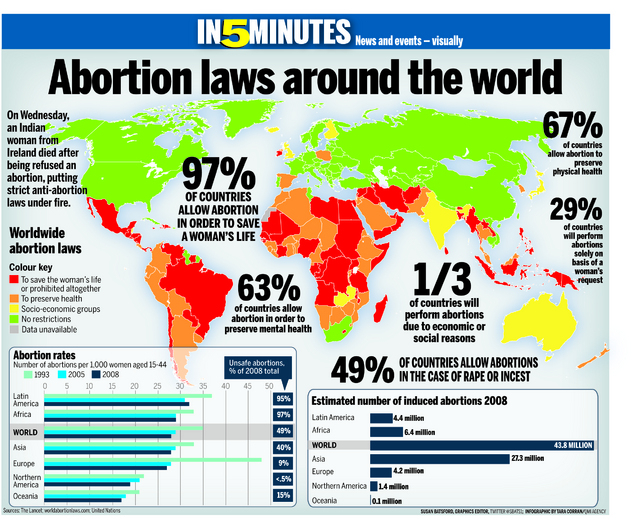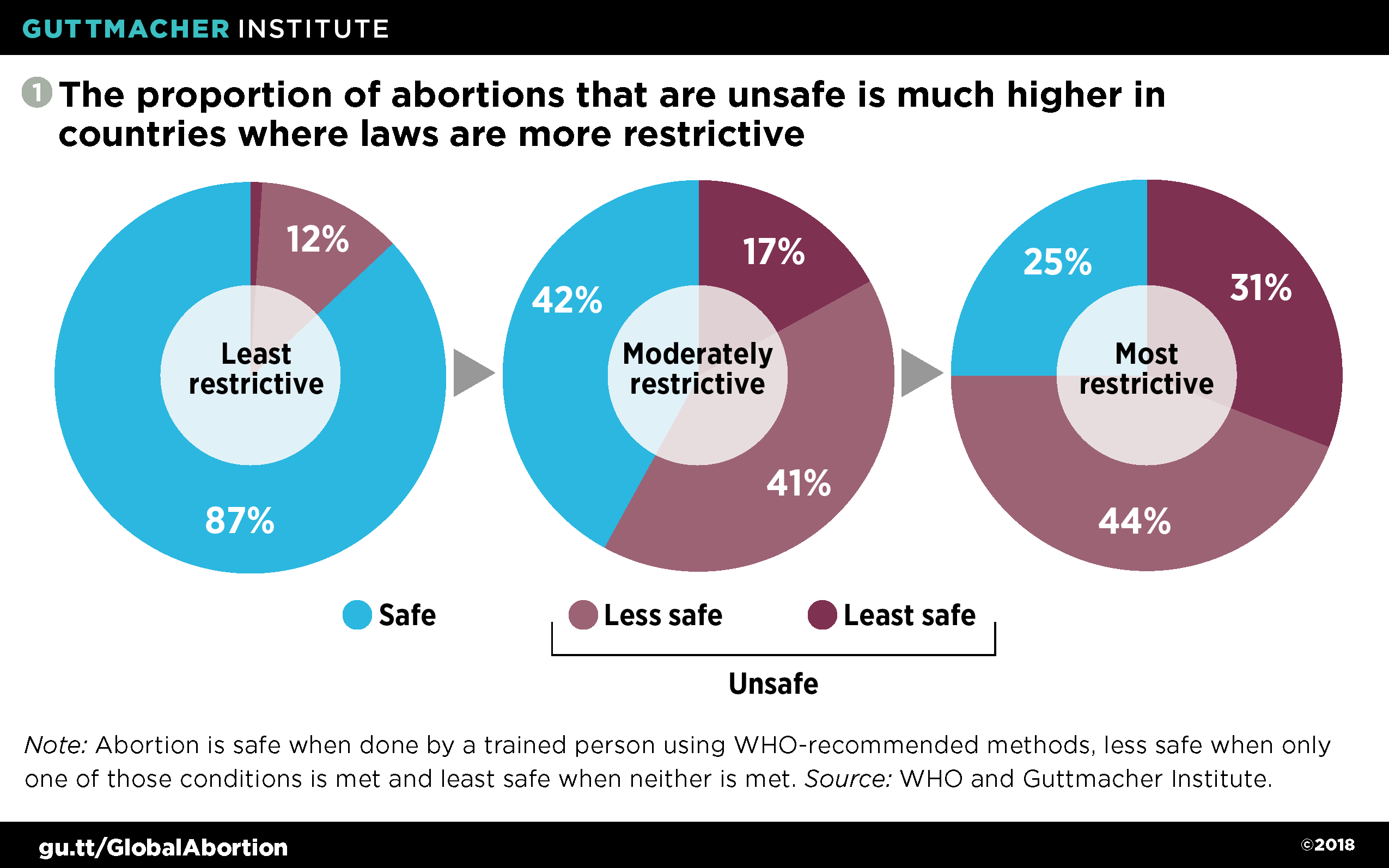Pregnancy is considered both a gift of nature to the woman as well as a risk. Sri Lanka has one of the strictest abortion laws in the world, which stipulates that abortion is illegal unless the life of the mother is at risk - that is only for what is considered "therapeutic". To prove that the mother's life is at risk, three doctors' signatures are necessary. The pregnancy should not be more than 24 weeks. Indications for therapeutic abortion include heart failure complicating pregnancy, severe pregnancy induced hypertension and suicidal tendency due to pregnancy. If the criteria for therapeutic abortion is not met, then the mother is just expected to bear it.
In neighboring India, medical termination of pregnancy is permitted if less than 28 weeks of gestation and if there is a danger to the life of the mother OR pregnancy following rape or incest OR if the child is handicapped. This is in contrast to our country - which as the graphic below shows has laws that are the most restrictive.

Jurisdictions around the world permit abortion on seven grounds. The grounds range from the most restrictive to the most liberal and are –
(1) to save the life of the woman
(2) to preserve a woman’s physical health
(3) to preserve a woman’s mental health(4) where the pregnancy is the result of rape or incest
(5) because of foetal impairment
(6) for economic and social reasons
(7) on request
It is reported that since 1974, the vast majority of legal reforms relating to abortion in Sri Lanka have only broadened the circumstances under which it is legal. As stated above, Sri Lanka falls into the most restrictive category. To explore a definitive record of the legal status of abortion in countries across the globe, updated in real time - after reading this article! - visit https://reproductiverights.org/worldabortionlaws
Abortion is medically defined as the expulsion of the content of a gravid uterus before the onset of natural delivery. The legal term for criminal abortion is ironically "miscarriage". It is clear that, with the enforcement of strict abortion laws in a country, the rate of criminal abortions rise and less restrictive abortion laws impede the ‘back door abortionists'.

Although Sri Lanka’s maternal mortality rate is low, unsafe abortions and their consequences account for a high proportion of the deaths that do occur, and the mortality rate for abortion stands at about 15%. Following unsafe abortion, women may experience a range of harms that affect their quality of life and well-being, with some women experiencing life-threatening complications. The major life-threatening complications resulting from the least safe abortions are haemorrhage, infection, and injury to the genital tract and internal organs. These all require urgent emergency medical - but how many receive even that??
Section 303 to 307 of the penal code of Sri Lanka deals with the issue of abortion. It's worth to have a look at the actual law. At least read section 303.

The Penal code (Amendment) bill 1995, proposed the legalization of abortions in instances where the victim is a prey of a sex crime such as rape, incest or where the fetus is impaired. However, the proposal was not sanctioned and the law remains the same to this day.
Thus a woman cannot legally have an abortion in cases of rape (which like anyways takes 20 years to 'prove' in our legal system!), incest or foetal deformities - even at the earliest stages of pregnancy. Even if abortion for these reasons was decriminalised, it would only account for a small fraction of annual abortions in the country. Women in Sri Lanka who seek access to abortion are usually over 35 years old, who already have two children and do not fall within any of the categories mentioned.
If a woman does want an abortion it is said that some private hospitals offer safe abortions if she has the money for it. Otherwise she would have to search for places and procedures by word-of-mouth - the backdoor abortionists - and put her trust in them. I don't want to mention the methods here.
According to the Abortions Right Coalition of Canada, there isn't a shred of evidence that restrictions on abortion are effective or helpful for women or society. In fact, they are unjust, useless, and harmful – often extremely so.
• Fail to dissuade women from abortion
• Subject women to unsafe abortion from unskilled or unscrupulous practitioners
• Kill and injure large numbers of women
• Turn women into criminals, or state-controlled babymaking machines
• Prioritize ideology and religious doctrine above peoples’ lives and health
• Disproportionately impact disadvantaged women, such as the poor, young, immigrant, indigenous, and uneducated
• Institutionalize the stigma of abortion
• Discriminate against women and violate their equality rights (since anti-abortion laws do not apply to men)
• Foster prejudice against women who need an abortion
• Reject women's moral reasoning, and distrust them to make their own decisions
• Punish women for having sex for pleasure, and for "shirking" motherhood
• Reduce access to safe abortion and impede medical care
• Increase the medical risks of legal abortion by delaying or obstructing care
• Marginalize abortion care and providers outside the
healthcare system
• Block or hamper medical research into improved abortion care and methods
• Disrespect professional medical judgments made in the patient’s best interests
• Interfere in the confidential doctor/patient relationship
• Put a chill on healthcare delivery by threatening healthcare workers with prosecution
• Criminalize and imprison healthcare workers for trying to help or save patients
• Turn women’s healthcare into a political target for legislators and the anti-choice movement
• Contribute to making clinics and providers victims of harassment and terrorism, including witch hunts, picketing, vandalism, arsons, bombs, and murders
Even if we for a moment consider the most extreme "pro-life" argument for banning abortion - that life begins at conception and thus any termination of pregnancy at any stage of pregnancy constitutes "murder" as every "person" has a right to life - it still doesn't actually stop the unsafe abortions that do occur! Everyone of us, I hope, agree that contraception could prevent unwanted pregnancies within marriages - which is the reason for the vast majority of abortion in Sri Lanka and everyone of us, I hope, agree that we need more awareness for the effective use of contraceptive methods. But we don't live in a perfect world. Terminating a pregnancy seems to be one of the most toughest traumatic decisions a woman can make. Despite it being illegal and unsafe - many women still go for it. It's for their best interest then that they can do it safely. If pro-lifers are afraid that decriminalizing it would encourage more married women to terminate their unwanted pregnancies - why don't they try convincing them of how "immoral" it is. Give them the choice instead of imposing it through the state.
According to the WHO, unsafe abortion can be prevented through:
1) comprehensive sexuality education;
2) prevention of unintended pregnancy through use of effective contraception, including emergency contraception; and
3) provision of safe, legal abortion.
In addition, deaths and disability from unsafe abortion can be reduced through the timely provision of emergency treatment of complications
we’ve got to mobilize the public, because if you keep it in the hands of parliamentarians and religious leaders, there is no way the restrictive law and all the negative consequences that come with it are going to change. Contrary to the popular argument, it’s not even Sri Lankan culture, but rather British Victorian values and laws that criminalize women
- Sonali Gunasekera, Director of Advocacy at the Family Planning Association of Sri Lanka
We hope that one fine day, Sri Lankan women, including adolescents, with unwanted pregnancies can, instead of resorting to unsafe abortion, opt for a safe legal abortion without barriers. Liberal laws, free health service, ease of access, awareness and efficient processes are necessary ingredients for this objective. Decriminalising abortion is the first step to achieving this. We can hope that lawmakers may be moved by the pathetic situation and our earnest requests, and finally accept the proposals to reform the law.

















0 comments: